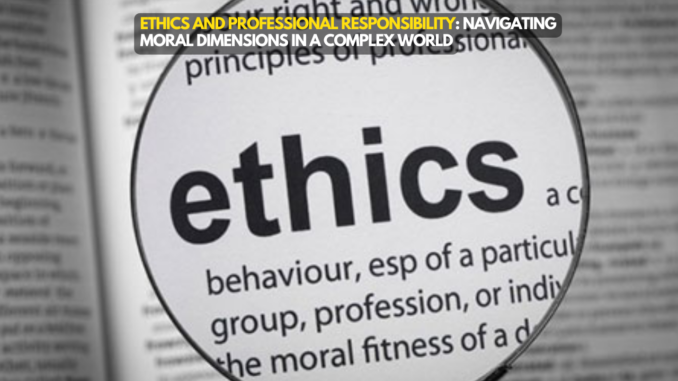
Ethics and professional responsibility are fundamental pillars that underpin the conduct and behavior of individuals in various spheres of life, especially in professional settings. In a world characterized by diversity, globalization, and rapid technological advancements, the need for a strong ethical compass and a sense of professional responsibility is more critical than ever before. These principles guide our actions, decisions, and interactions, shaping not only our personal integrity but also the larger fabric of society. This essay delves into the intricate interplay between ethics and professional responsibility, examining their significance, challenges, and potential solutions in the modern landscape.
Understanding Ethics and Professional Responsibility:
Ethics refers to the study of what is morally right and wrong, guiding individuals in their decision-making processes. It encompasses a set of principles and values that define human behavior, both in interpersonal relationships and in professional contexts. Professional responsibility, on the other hand, pertains to the obligations and duties that individuals assume when they join a specific profession. It involves adhering to codes of conduct, maintaining competence, and ensuring accountability for one’s actions.
Ethics and professional responsibility are closely intertwined, as the latter is an application of the former in specific occupational roles. Professionals are expected to uphold ethical standards that are often more stringent than those expected in personal life due to the potential impact of their decisions on others and society at large. These standards not only ensure the welfare of clients, colleagues, and stakeholders but also contribute to the credibility and integrity of the profession as a whole.
The Significance of Ethics and Professional Responsibility:
- Trust and Credibility: Ethics and professional responsibility are foundational elements in establishing and maintaining trust. Clients, customers, and colleagues must have confidence in the competence and integrity of professionals to engage in meaningful interactions.
- Risk Mitigation: In professions such as medicine, law, and finance, ethical behavior can prevent potential harm to individuals and communities. Adhering to ethical guidelines reduces the likelihood of legal repercussions and reputational damage.
- Social Impact: Many professions have far-reaching consequences on society, from architects shaping urban landscapes to journalists influencing public opinion. Upholding ethical standards ensures that these impacts are positive and beneficial.
- Personal Fulfillment: Acting ethically and responsibly can lead to a sense of personal fulfillment and satisfaction. Knowing that one’s actions are aligned with a strong moral compass enhances individual well-being.
Challenges in Upholding Ethics and Professional Responsibility:
However, the modern landscape presents several challenges that can test the commitment to ethics and professional responsibility:
- Globalization: Professionals often work across borders and cultures, where ethical norms may vary. Navigating these differences while maintaining core ethical principles can be complex.
- Technological Advancements: The rapid pace of technological change introduces novel ethical dilemmas. For example, the field of artificial intelligence raises questions about privacy, bias, and the potential loss of human agency.
- Conflict of Interest: Balancing personal interests, financial gains, and ethical obligations can be intricate, especially in fields like finance and corporate management.
- Pressure and Competition: Professionals might face pressure to cut corners or compromise ethical standards in pursuit of career advancement or business success.
- Legal and Regulatory Challenges: Ethical obligations sometimes conflict with legal requirements, placing professionals in morally ambiguous situations.
Fostering Ethical Behavior and Professional Responsibility:
Addressing these challenges requires a multifaceted approach that involves individuals, educational institutions, professional organizations, and society as a whole:
- Education and Training: Incorporating ethics education throughout academic and professional training equips individuals with the tools to navigate ethical complexities confidently.
- Transparent Codes of Conduct: Professions should develop and enforce clear, comprehensive codes of conduct that provide guidance in various scenarios, helping professionals make informed decisions.
- Whistleblower Protection: Establishing mechanisms to protect whistleblowers who expose unethical behavior encourages accountability and transparency within organizations.
- Continuing Professional Development: Encouraging ongoing learning and development ensures that professionals stay updated on evolving ethical challenges and solutions.
- Ethics Committees: Professional organizations can establish ethics committees to provide guidance, address ethical concerns, and develop best practices.
- Public Awareness: Initiatives that raise public awareness about ethical considerations in various professions can create informed demand for ethical behavior.
- Cross-Professional Collaboration: Professionals from different fields can collaborate to share insights and best practices for addressing ethical challenges that transcend individual disciplines.
Conclusion:
In a world where the consequences of actions are increasingly interconnected, ethics and professional responsibility stand as beacons guiding individuals through complex decision-making landscapes. Upholding these principles is not only vital for personal integrity but also for the well-being of society as a whole. As we navigate the challenges posed by globalization, technology, and competition, a steadfast commitment to ethics and professional responsibility remains a cornerstone of a just and prosperous world. It is a continuous journey that demands collective effort, adaptability, and unwavering dedication to creating a better future for all.

Leave a Reply